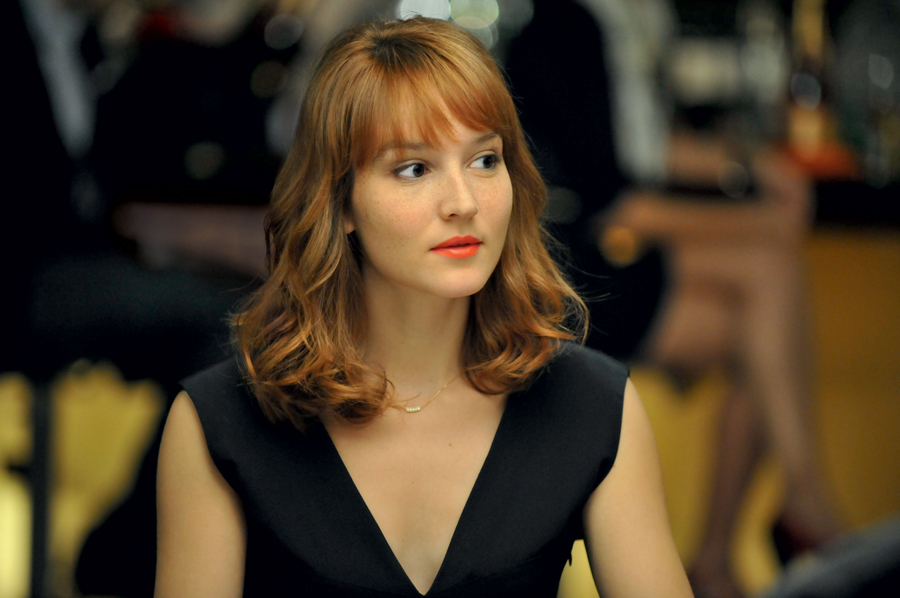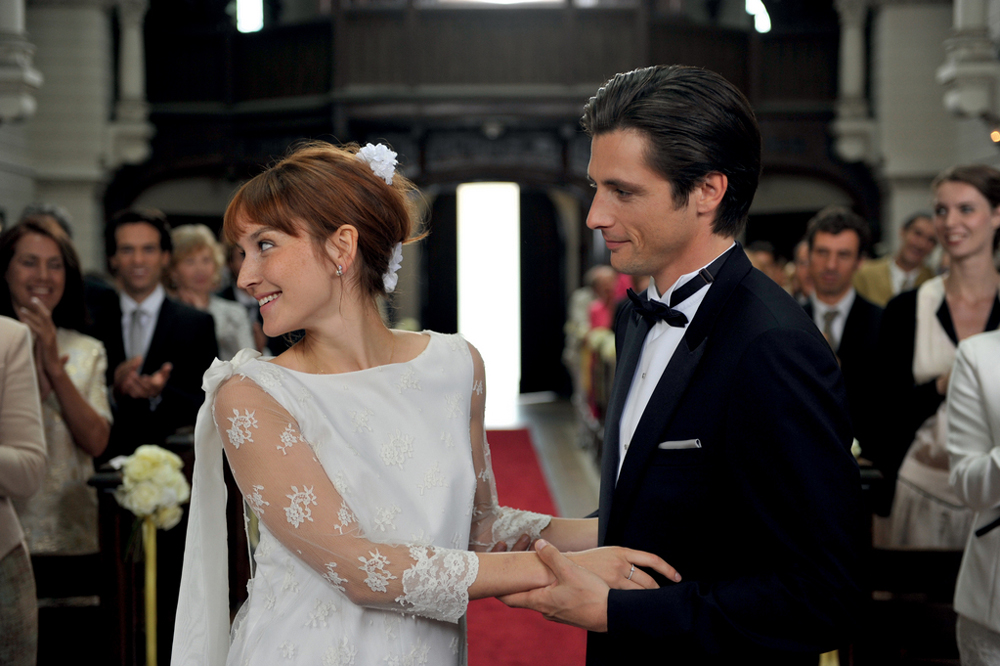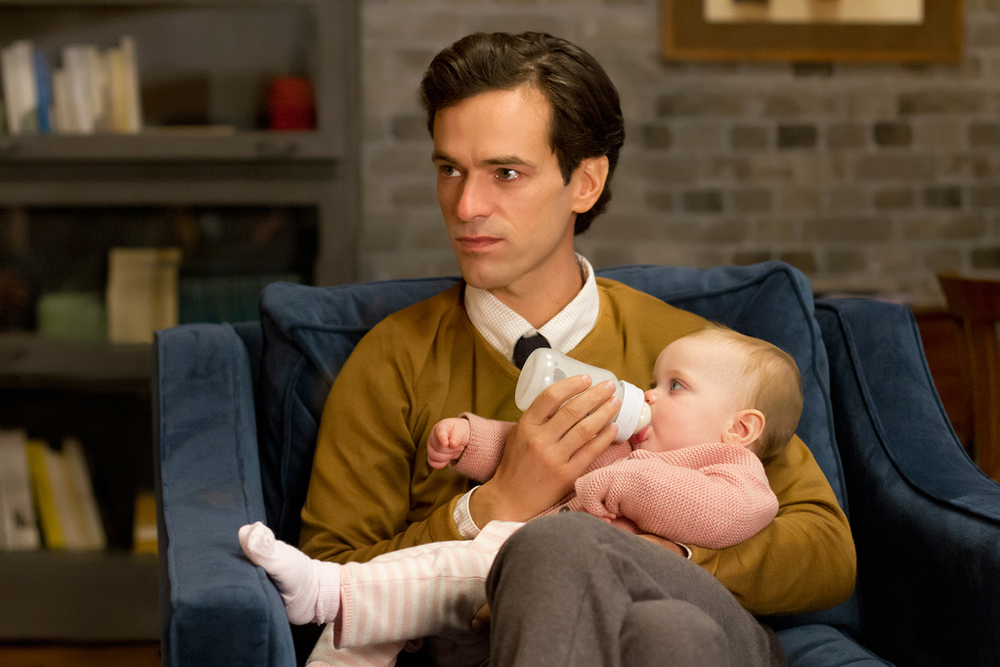“Cinema Is About Desire” – François Ozon on ‘The New Girlfriend’

As the creatively dexterous force behind such global hits as Swimming Pool, 8 Women and Potiche, François Ozon is arguably France’s most internationally successful director who doesn’t make action movies.
His latest film The New Girlfriend has its New Zealand premiere this weekend at the Alliance Française French Film Festival, which is currently underway in Auckland and will soon move throughout the country.
In The New Girlfriend, rising French star Anaïs Demoustier (The French Minister) plays Claire, a young woman who develops a close relationship with David (French superstar Romain Duris), the widowed husband of Claire’s lifelong bestie Laura, whose funeral opens the film. Making things interesting is David’s female persona ‘Virginia’, who stirs something unexpected in Claire.
We recently had the chance to speak to Ozon about the film in Paris. He comes across in person exactly as you’d imagine based on his films – immaculately presented, superlatively attractive, and sporting a wry, devilish grin. Keep that image in mind when reading the following conversation, which Ozon conducted entirely in English.
FLICKS: Your films are always filled with ridiculously good-looking people. Are you capable of casting an unattractive actor?
François Ozon: Cinema is about desire. If you don’t fall in love with your actors and your actresses, then they are no good on screen for me. So maybe it’s natural for me.
This film is about desire and emotions and you have to be very close to them. It doesn’t mean I have sex with everybody.
How important is it for you that everything in your films, not just the actors, looks beautiful?
I like the contrast between the beauty of things on the surface and the complex, darker and dramatic things on the inside. This is a film which mixes different genres, and different tones. And I wanted to accept that.
I think the film is a trans-genre movie, like the character! So I was playing with different tones. It begins like a melodrama and suddenly it goes back to the comedy and after that to the thriller.
And I wanted to follow the character of Claire, she’s the lead character, and she crosses different situations and feelings. She living both attraction and revulsion for David/Virginia so I wanted to play with that. She’s lost in the desire of what she’s feeling so I wanted to give the same feeling to the audience.
This movie has a sex scene unlike any other.
It’s funny because when I wrote the script I had written a note for the producer saying ‘This scene must be the most beautiful lesbian scene you have never scene’. And at this moment Blue Is The Warmest Colour was out. Everybody saw that film and the lesbian scene and it was all ‘Oh my God’.
All my lesbian friends were very upset against the film, they said to me ‘We don’t do sex like that. We don’t slap on the bottom all the time’. So I said ‘I want to make a lesbian scene, help me!’. So I asked them many questions and I tried to make a beautiful lesbian scene. But it’s twisted at the end of course. It’s a very festishistic scene too.
It’s a film about the loss of reference points, like ‘What is masculine, feminine?’ I wanted to give the feeling of anything being possible.

Ruth Rendell wrote the original story?
The short story is ten pages. I had to make a big adaptation. It’s a murder story. The short story is more about repressed lesbian desire. I changed many things. So of course I betrayed the short story.
I’m very curious to see how Ruth Rendell will react to my film. I think she’s clever enough to know that when you [adapt] a ten page story [into] a feature film you have to add things.
How did you come to cast Romain Duris as David/Virginia?
I had Ewan McGregor in mind. I think he would be a beautiful woman. I think he has been a beautiful woman in a film before.
When I decided to make the film in French, I met many French actors and I did make-up tests with many of them. Some were very nervous. Romain Duris had said in an interview “One of my dreams is to play a woman” so I asked him to come. And it was so funny to do tests with him, he took such pleasure in cross-dressing, I realised it was obvious to cast him in the part because I wanted the audience to share in the pleasure of cross-dressing.
When there is a lot of desire in an actor to play a part, 50% of the work is done. I didn’t want something dramatic or too sad because obviously the situation they are in is sad. With Romain it was more childish, playful.
You’re known for skilfully generating suspense, but this film kind of plays with those expectations.
Suspense is not with the exterior, suspense is inside the characters. It’s a story about characters who are lying to themselves, and to others. And it took them time to know what they are feeling, and what they are living. They think it’s just friendship then they realise it’s love. So the suspense is a sentimental suspense.
Of course I had Hitchcock in mind because I realised this story is about death, you make someone live again, so it has a lot of connection with Vertigo of course. The character of Claire is like Scottie.
I think it’s a film about mourning, how we all deal with mourning and these two characters are able to create a third one in order to help each other overcome the loss. Also for me it’s a film about freedom, about emancipation.

What do you hope viewers take away from this film?
It was important for me to make not a commercial film, but a film for everybody. Because when I wrote the script, in France we were having a lot of protests against gay marriage and people were very aggressive about equality between men and woman. And I realised my film will become political because of the subject, so I asked myself ‘How can I convince these people to understand that desire is complex and family can be different, there is not one ideal family’. That’s why I decided to tell the story like a fairy tale.
The film has just been released in France and it is successful, but we have had a lot of aggressive reactions from the right-wing.
Are you always trying to surprise your audience?
I want to surprise myself. I’m my first audience. For me, a film has to be a game – there is a pact at the beginning of the film: ‘Do you want to play with me?’. We know it’s a story. It’s a game.
You’re often compared to Hitchcock. Is that something you’re okay with? Does it create any pressure?
Yes of course, I’m okay with it. I love Hitchcock. I’m not stressed about it. I’m flattered. I admire him.
What’s up next for you?
I had a project but it was cancelled because we didn’t have the rights to the book. I will shoot this year but I don’t know yet what. I try to make a film a year. And I’m expecting to surprise myself because I don’t want to repeat myself and so I try to have new challenges. I try each time to go in a new direction, to have a new experience.
The New Girlfriend screens several times throughout the Alliance Française French Film Festival.


















